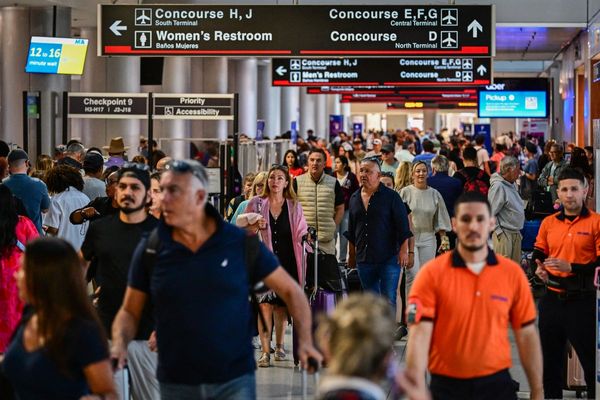
When Scott Morrison and then defence minister Linda Reynolds were developing the secret project that would ultimately be dubbed AUKUS, Australian negotiators reportedly advised against giving the go-ahead to approach the US while Donald Trump was president.
Officials believed Trump was too unpredictable, although Morrison has said he believed Trump would have said yes to the proposal.
“The moment that decision arrived at the Pentagon, it would have come back, not because they didn’t trust Trump but because of their absolute, complete protection of naval technology,” Morrison conceded to The Australian Financial Review last year. “Without any prior engagement it was likely that the US head of Naval Reactors would have said no.”
Only after Trump’s first term ended and Joe Biden had entered the White House did Australia “seize the moment”, as The Canberra Times reported in 2021.
Did anyone involved imagine Trump would be reelected? Well, the “America First” president is back, as unpredictable as ever, and world leaders are struggling to figure out how to get on his good side. While AUKUS proponents in Australia and the US have repeatedly said Trump is likely to continue America’s support for the submarine alliance, it’s obvious why doubts remain.
When Prime Minister Anthony Albanese briefed reporters on his Tuesday morning phone call with Trump, he wouldn’t confirm if the president had indicated he was in favour of AUKUS. Instead, Albanese reiterated his own support for the deal.
“Quite clearly, I’ve indicated there’s very positive support for the AUKUS relationship,” Albanese said. “I have no intention of speaking on behalf of President Trump, that is up to him. But quite clearly I’ve indicated there’s strong bipartisan support for AUKUS in Australia and in the United States.”
Trump has never publicly discussed AUKUS. But his new secretary of defence, Pete Hegseth, said at the weekend his boss was “very aware, supportive of AUKUS” and that Trump recognised the importance of “robust allies and partners” in the Indo-Pacific.
But Australians need only look at how Trump has treated its northern neighbour Canada to remind themselves of how Trump treats his allies and partners.
After Trump threatened to “make Canada the 51st state” and put in place sweeping 25% tariffs on Canadian products, the northerners understandably felt “one of the world’s most durable and amicable alliances” had been “broken”, as the Associated Press reported last week.
Australia’s government realises that AUKUS’ future is far from certain now, which is likely why Defence Minister Richard Marles, during his recent trip to the Pentagon, made a point of reminding Hegseth of the half a billion US dollars (A$798 million) Australia had recently paid to Washington as part of the submarine deal.
Standing next to Marles at a press conference in the US capital last Saturday, Hegseth remarked: “The cheque did clear.”
But just two days later, Trump roiled global financial markets and alarmed Australia by declaring he would announce 25% tariffs on steel and aluminium imports to the US. Such duties would have a ripple effect through the Australian economy — and AUKUS could become a bargaining chip as Australia seeks to avoid them.
“Trump did this last time he was president, and Malcolm Turnbull basically negotiated an exemption for Australia, and so we may be able to do that again — particularly because Marles was just in the US handing over a big cheque,” UNSW Business School Professor of Economics Richard Holden told Crikey.
“Trump is totally transactional, but at least we’ve got something that he wants. The AUKUS alliance is clearly important for both countries, so we may well be able to get an exemption, but we’ll have to wait and see.”
Albanese’s comments regarding his discussion with Trump over a tariff exemption for Australia were carefully stage-managed.
“I presented Australia’s case for an exemption, and we agreed on wording to say publicly, which is that the US president agreed that an exemption was under consideration for in the interests of both of our countries,” Albanese said on Tuesday.
Just a few hours later, Trump reportedly announced the steel and aluminium tariffs would be enforced “without exceptions and exemptions” — although he hinted he would give “great consideration” to the trade surplus the US runs with Australia.
Even assuming Trump will come out strongly in favour of AUKUS, there have always been doubts whether US shipyards have the capacity to make enough boats to share them with Australia.
Curveballs are being thrown in that area too. As Reuters reported at the weekend, Elon Musk is expected to turn his focus to the Pentagon’s shipbuilding processes as he pores through government departments in his mission from Trump to find opportunities for budget cuts.
“There is plenty to look into in shipbuilding, which is an absolute mess,” national security adviser Mike Waltz told NBC.
Australian National University Emeritus Professor of Strategic Studies Hugh White said AUKUS was in “even deeper trouble than before” with Trump back in the Oval Office.
“Of course Trump will be tempted to up the price, because he has Australia over a barrel. But it is worse than that,” White told Crikey. “Huge problems in US shipyards meant it was always a long shot that America would have submarines to spare to pass to Australia. The chaos in Washington engineered by Trump makes it even less likely that the problems will be fixed.”
In White’s view, the US will only be able to honour the AUKUS deal by “seriously weakening” America’s naval capabilities.
“Trump is the least likely person to reduce America’s strength to help an ally,” White said. “Whatever his lieutenants might be saying now, Trump will abandon the whole deal in a heartbeat when these realities sink in.”









